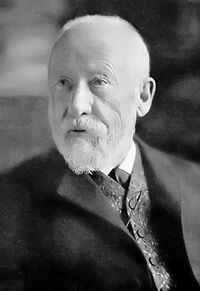Philosophy of life
Topic: Philosophy
 From HandWiki - Reading time: 6 min
From HandWiki - Reading time: 6 min

A philosophy of life is any general attitude towards, or philosophical view of, the meaning of life or of the way life should be lived.[1] The term is generally used in an informal sense, meaning a personal philosophy whose focus is resolving basic existential questions about the human condition rather than an academic philosophical endeavour.[2]
The term also refers to a specific conception of philosophizing as a way of life,[3] endorsed by the German Lebensphilosophie movement whose main representative is Wilhelm Dilthey[4] and several other continental philosophers such as Henri Bergson[5] and Pierre Hadot.[3]
The human situation
The human situation appears to be a struggle between what is (existence) and what ought (essence) to be.
- Normative situations – Alternatives, Choice, Freedom, Values, Standards, Ideals, Obligation, Responsibility
- Existential predicament – Finitude, Alienation, Anxiety, Guilt, Ambivalence, Thrownness
Main answers to the existential question
There are at least three prevailing theories on how to respond to the existential question.
Denial of essence
- Nihilism, denial of meaning
Denial of existence
Affirmation of life
Religion as an attempt to overcome the existential predicament
There are two basic forms of existentialism:
Religious existentialism
Christian existentialism is best exemplified by St. Augustine, Blaise Pascal, Paul Tillich, and the philosophy of Søren Kierkegaard. Religious existentialism holds that there are two levels of reality, essence, which is the ground of being, and existence. Religion is the ultimate concern in this view.
Atheistic existentialism
Atheistic existentialism is best exemplified by Friedrich Nietzsche, Martin Heidegger, and Jean-Paul Sartre. It holds that there is one level of reality, existence. In this view, each person constructs his own unique and temporary essence.
See also
- Absurdity
- Henri Bergson
- Wilhelm Dilthey
- Essence
- Existence
- Existential crisis
- Ferdinand Fellmann
- Viktor Frankl
- German Idealism
- Pierre Hadot
- Human situation
- Hans Jonas
- Søren Kierkegaard
- Lebensphilosophie
- Meaning of life
- Self-discovery
- Vitalism
References
Notes
- ↑
- "Philosophy of life". Philosophy of life. HarperCollins Publishers. 2019.
- "Philosophy of life". Philosophy of life. Merriam-Webster. https://www.merriam-webster.com/dictionary/philosophy%20of%20life. Retrieved September 29, 2020.
- ↑ Timothy Fetler, Philosophy and Philosophy of Religion Charts, Sun Press, 1968.
- ↑ 3.0 3.1 Pierre Hadot (1922-2010) by Matthew Sharpe in the Internet Encyclopedia of Philosophy.
- ↑ Scott Campbell, Paul W. Bruno (eds.), The Science, Politics, and Ontology of Life-Philosophy, Bloomsbury, 2013, p. 8.
- ↑ Michael Chase, Stephen R. L. Clark, Michael McGhee (eds.), Philosophy as a Way of Life: Ancients and Moderns – Essays in Honor of Pierre Hadot, John Wiley & Sons, 2013, p. 107.
Further reading
- William James and other essays on the philosophy of life, Josiah Royce
- Existential philosophy, Paul Tillich
- Reconsidering Meaning in Life
- Philosophy of Life in Contemporary Society
External links
- Academic journals
 KSF
KSF